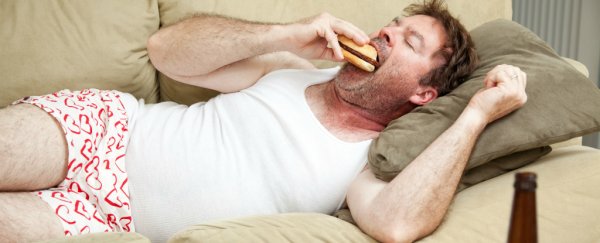After a big night of drinking, while nursing a hangover in bed, it's not uncommon to crave the saltiest, yummiest, most unhealthy food imaginable. When living on a college campus, where fast food is rampant, the end result is practically inevitable.
This is what college students call the "drunchies" (aka drunk munchies), and a new study suggests the phenomenon could be an important culprit behind the obesity epidemic.
The study, which surveyed students from a public undergraduate university in the US, reveals that alcohol consumption has a notable impact on the food choices of college students, both during the night of drinking and during breakfast the morning after.
Like so many other consequences of heavy drinking, the dietary changes incurred from alcohol use are not good. Not only do college students appear to eat more after drinking, the study found they also tend to choose the most unhealthy foods available.
"Given the obesity epidemic and the rates of alcohol consumption on college campuses, we need to be aware of not only the negative effect of alcohol consumption, but also the impact it has on what people are eating while they are drinking," says lead author Jessica Kruger, an expert in community health and health behaviour at the University of Buffalo.
Kruger and her team believe that alcohol causes excess eating by changing the amount of blood glucose in the body, so it falls and rises, tricking the brain into feeling hungry.
When 65 percent of all US college students partake in regular alcohol consumption and almost 45 percent participate in heavy drinking sessions, figuring out the reasons behind "drunchies" is a public health issue worthy of further research. Up until now, however, there has been scarce research to support the notion that alcohol changes our eating behaviours for the worse.
Kruger and her team were compelled to investigate the matter after seeing an advertisement in a university newspaper.
"It said, 'Got Drunchies?' and had ads for pizza, tacos, and other fast-food places that were open late after the bars closed," says Kruger.
Weight gain is a common consequence of drinking alcohol, especially among younger populations, and it is easy to see why. The average beer, for instance, contains 150 calories. Multiply that by several drinks and - voila! - you've got an overwhelmingly large portion of a person's daily energy intake. Now add a taco, a burrito, or a pizza to the mix. It doesn't take a mathematician to figure this one out.
"So, we dug a bit deeper and first figured out what the 'drunchies' were, and then decided this would be interesting to study," explained Kruger.
"Our first study in this area focussed on what people ate while drinking alcohol. This study explored what they eat the day after drinking."
Kruger and her team surveyed 286 ethnically diverse and gender-balanced undergraduate college students in an anonymous, online setting. The survey began with questions like, "What do you typically eat for your first meal of the day?" and "How often do you eat something before you go to bed?"
Later, the study pivoted to asking participants what they ate and how often they ate on a boozy night out and on their first meal the day after.
"All alcohol drinkers were more likely to eat something before they went to bed after drinking alcohol than in general before they go to bed," the authors wrote.
The food of choice for alcohol drinkers was also consistent. When drunk, most alcohol users tended to opt for salty snack foods and pizza, while healthy foods like vegetables were eschewed.
"After drinking alcohol, participants reported being more likely to eat salted snack foods and pizza, and being less likely to eat healthy foods such as cooked or canned beans, dark green vegetables, orange coloured vegetables, [and] other vegetables, than they would ordinarily," the study reads.
"This could be due to the decreased availability of these foods during episodes of drinking or thereafter."
Perhaps more worrying, however, was the fact that college students are not drinking more water or other non-alcoholic beverages to hydrate themselves before hitting the sack. Compounding the problem, dehydration often leads to further unhealthy food choices.
The day after drinking, students also change their feeding habits. The study found that students who drink the night before are less likely to skip their first meal of the day compared to their usual routines.
For the first meal after a night out, students tend to favour foods like pizza or tacos over grains and milk and dairy products, which are commonly eaten at breakfast. The authors believe this could be occurring because it is a common myth that salty foods are "hangover cures" that "soak up" the excess alcohol.
In light of the findings, the authors suggest that universities help to promote and encourage healthy eating and hydration throughout the day and late at night, by limiting the number of fast food options and educating students on the most nutritional things to eat when inebriated.
After all, early adulthood is one of the most important times to prevent weight gain and encourage healthy eating habits for life-long weight management.
The study has been published in the Californian Journal of Health Promotion.
